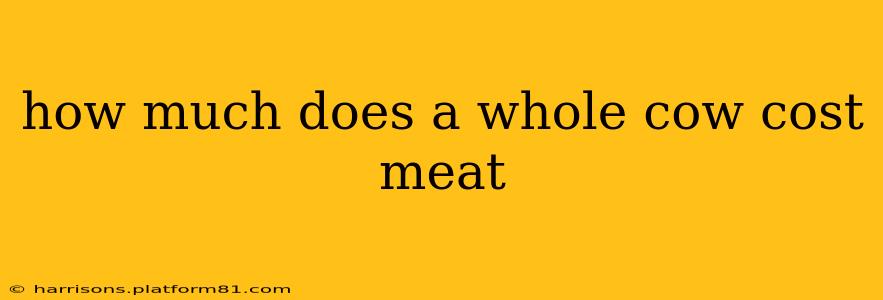Buying a whole cow can seem daunting, but it offers significant savings compared to purchasing individual cuts at the grocery store. However, the price varies considerably depending on several factors. This guide breaks down the cost, helping you understand what to expect and how to make an informed decision.
What Factors Influence the Cost of a Whole Cow?
Several key factors determine the final price you'll pay for a whole cow:
-
Weight: The most significant factor is the cow's weight. Larger cows naturally cost more than smaller ones. Prices are typically quoted per pound of hanging weight (the weight of the carcass before butchering).
-
Breed: Different breeds of cattle have varying qualities of meat, impacting price. Wagyu beef, known for its marbling and tenderness, commands a much higher price than a standard Angus beef cow.
-
Location: Geographic location significantly impacts cost. Rural areas may have lower prices due to reduced transportation and processing fees.
-
Processing Fees: These fees cover butchering, cutting, wrapping, and freezing the meat. They are usually separate from the cost of the cow itself. Fees can vary based on the butcher's location and services offered.
-
Additional Services: Some providers offer additional services like aging the meat, making custom cuts, or delivering the packaged meat. These extras add to the overall cost.
How Much Can I Expect to Pay?
Providing an exact price is impossible without specifics, but we can give you a general idea. Expect to pay anywhere from $3 to $8 per pound of hanging weight, depending on the factors mentioned above. A typical cow weighs between 600 and 1200 pounds, meaning the cost of the cow alone could range from $1800 to $9600. Add to this the processing fees (typically ranging from $600 to $1200 or more), and you get a total cost that can range from approximately $2400 to $10,800 or potentially even more for premium breeds and additional services.
How Much Meat Do You Get From a Whole Cow?
The amount of usable meat you get varies depending on the cow's weight and the butcher's cutting practices. Generally, you can expect to receive approximately 50-60% of the hanging weight as usable meat. This means a 1000-pound hanging weight cow may yield approximately 500-600 pounds of usable meat cuts.
What are the different cuts of beef?
A whole cow provides a wide variety of cuts, ranging from tenderloins and ribeyes (the most expensive) to tougher cuts like chuck and shank, ideal for stews and slow cooking. You'll get a diverse selection, allowing you to explore different cooking methods and recipes.
What's the best way to find a farmer or rancher to buy from?
Finding a reputable source is key. Start by contacting local farmers' markets, searching online for local farms and ranches, or checking with your state's agricultural department for listings. Visiting the farm and meeting the rancher allows you to ask questions about their practices and the quality of their cattle.
How long does it take to get the meat after buying a cow?
The timeframe depends on the rancher's schedule and the butcher's availability. Allow several weeks to a couple of months from purchase to receiving your meat. Proper planning is essential.
How do I store a whole cow worth of meat?
Efficient storage is crucial. You'll likely need significant freezer space, potentially requiring multiple freezers or a large chest freezer. Properly packaging and labeling the meat ensures optimal quality and prevents freezer burn. Consider using vacuum sealing for longer storage.
Is buying a whole cow really worth it?
The cost-effectiveness depends on your consumption habits and access to bulk storage. If you consume a significant amount of beef and have adequate freezer space, buying a whole cow can be considerably cheaper than regular grocery store purchases. Weigh your needs and resources carefully before making a decision.
By considering these factors and weighing the pros and cons, you can make an informed decision about whether buying a whole cow is right for you. Remember to do your research, ask questions, and find a reliable source to ensure a positive experience.
